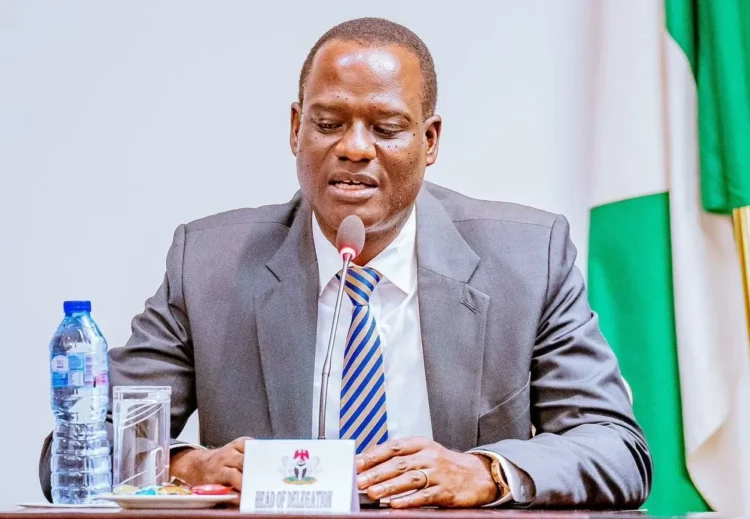Despite the recent passage of four new tax laws by President Bola Tinubu’s administration, Nigeria’s ambitious tax reform drive appears to be at a critical crossroads.
Fiscal policy experts, private sector leaders, and economists have raised fresh concerns that, without deeper structural changes—especially a reduction in corporate tax rates and regulatory overhaul—the country’s tax system remains far from complete.
At the centre of this warning is the chairman of the Presidential Fiscal Policy and Tax Reforms Committee, Taiwo Oyedele, who said the gains from the recently signed tax laws risk being undermined if key reforms are not urgently implemented.
“We are not done,” Oyedele said, in a pointed commentary shared this week. “Corporate tax is still too high. We need to lower the effective rate on businesses to make Nigeria competitive and stimulate economic expansion. Otherwise, we are simply taxing capital, not profit, especially in an environment already struggling with high inflation.”
Some industry experts have echoed this sentiment, arguing that while legislative progress has been made, the operational climate for businesses, particularly MSMEs and start-ups, remains harsh, uncompetitive, and inefficient when compared to peer economies such as Ghana, Egypt, Kenya, and Rwanda.
In a paper entitled ‘Designing Tomorrow: Policy Blueprint and Lessons for the Future’, Oyedele said, “We need to lower corporate tax rates on businesses to attract more investments and stimulate expansion. With high inflation, a high tax rate will invariably be taxing capital, not profit.”
He is not alone in that call.
Professor of Economics at the University of Benin, Hassan Oaikhenan, agrees with him. He said while the government is fixated on mobilising non-oil revenue to fund national expenditures, it must create the enabling environment for businesses to operate and thrive.
One of the most urgent demands is a downward review of Nigeria’s effective corporate tax rate, currently estimated at over 35 per cent when all taxes are considered. By contrast, Ghana’s corporate tax rate stands at 25 per cent, while Egypt’s ranges between 22.5 per cent and 25 per cent, depending on the sector. In Rwanda, the rate is 30 per cent but accompanied by generous tax credits, export incentives, and streamlined administration.
The Manufacturers Association of Nigeria (MAN) and the Nigeria Employers’ Consultative Association (NECA) have consistently warned that Nigeria’s tax regime is one of the most hostile for businesses on the continent.
“Businesses are being suffocated by multiple and excessive taxes,” said Segun Ajayi-Kadir, Director-General of MAN. “Even the new tax laws do not address the core burden faced by manufacturers, which is the sheer volume and unpredictability of taxes and levies across federal, state, and local levels.”
NECA, in its reaction to the tax reforms, noted that while the new laws’ harmonisation and legal clarity were a step forward, real reform requires simplifying tax compliance, eliminating duplication, and reducing firms’ overall burden.
But a retired coordinating director of the Federal Inland Revenue Service (FIRS), Igho Andy Ejemeyovwi, would not agree with those calling for a cut in the companies’ income tax. He said the authorities should first enforce the implementation of the new laws, end the issue of corruption within the whole system, and employ the right people to enforce the tax laws across the federation units.
The companies’ income tax is currently at about 35 per cent. “You cannot move from far up and cut it to almost two, and you say that will give us all that we need. I think it’s more than that. Maybe he’s trying to fly a cat. It’s not as easy as that,” he said, adding, “I personally believe in stepwise progression, not moving to something below.”
Professor Oaikhenan and Oyedele underscored the need to address Nigeria’s complex regulatory landscape, describing it as a significant impediment to growth.
“Regulatory overreach is equivalent to granting tax waivers—when you strangle businesses with multiple fees, levies and unnecessary hurdles, you drive them into informality,” he noted.
Nigeria’s import tariffs, especially on industrial inputs and raw materials, are also among the highest in sub-Saharan Africa. Oyedele cited World Bank comparisons showing that Nigeria’s average tariffs on raw materials are roughly double that of most neighbouring economies.
This disadvantages local manufacturers, particularly when competing with goods produced in more cost-efficient jurisdictions.
Tax Reform Must Go Beyond Laws
The experts say the administration must look beyond legislative changes and focus on overhauling the administrative and institutional framework of the tax policy in Nigeria.
“The focus now should be on implementation, digitalisation, and capacity building,” said tax consultant Chinedu Okeke. “Otherwise, we’re just passing laws that won’t change real outcomes.”
Ejemeyovwi said the new system should first be implemented to monitor outcomes.
“This is not the time for one to say cut it into two. It’s not that easy.”
His argument is that a reduction in corporate tax rates would adversely affect the availability of revenues to the various governments, which largely depend on tax revenue to fund their expenses.
“You are simply saying somebody who has been paying N30 billion should now be paying N10 billion. And there are no other things they can focus on as revenue sources. To me, allow the system to function first. Let us go on with what we have. After some time, we start looking at it,” Pastor Ejemeyovwi said in reaction to Oyedele and his co-travellers.
Both Professor Oaikhenan and Oyedele advocate for digital tax administration systems in Nigeria to reduce human interface and corruption. They also pointed out that the law on beneficial ownership registers should be faithfully implemented to track illicit financial flows.
Several persons have urged the federal government to simplify tax procedures for small businesses, ensure fiscal discipline to support long-term predictability in tax policy, and uphold public accountability for tax revenues.
The current tax environment presents significant challenges for micro, small and medium enterprises (MSMEs) and tech start-ups.
“You cannot grow a digital economy or encourage entrepreneurship when your tax policies penalise innovation,” said Adetola Adeniyi, a start-up founder in Lagos.
“Between withholding taxes, VAT compliance, local government levies, and arbitrary charges from state agencies, you end up spending more time avoiding penalties than focusing on growth.”
In contrast, Egypt and Kenya have introduced start-up-specific incentives, ranging from tax holidays to zero corporate tax thresholds for firms under certain revenue levels. Ghana has implemented measures that allow MSMEs to file taxes online and enjoy graduated tax rates based on turnover.
However, Nigeria’s Finance Act does provide some concessions for small businesses, such as VAT exemption thresholds and reduced CIT rates for certain income bands. However, experts say these are often undermined by inconsistent enforcement and a lack of awareness among taxpayers.
Another area of concern raised by Oyedele is the need to harmonise tax policy with Nigeria’s foreign exchange regime. He proposed that tax payments be made strictly in naira, a measure that would ease the burden on firms grappling with currency depreciation and scarcity.
“Tax authorities should not be demanding foreign currency payments when the government is encouraging de-dollarisation. It’s contradictory,” Oyedele argued.
Taxpayers who earn revenue in naira but are expected to settle liabilities in dollars or hard currency face distortions that reduce profitability and discourage compliance.
With the 2025 budget cycle around the corner and mounting fiscal pressure on the federal government, the urgency of deepening tax reform cannot be overstated.
“The Tinubu administration must decide whether it wants to continue with piecemeal adjustments or take bold steps to fix Nigeria’s outdated and inefficient tax system,” said an economist at the Nigerian Economic Summit Group (NESG), who requested anonymity.
“Cutting corporate tax, easing compliance, and rationalising regulatory frameworks are not just economic strategies—they are political imperatives.”
Despite the recent legislative updates, Nigeria’s tax system remains at a tipping point. Analysts warn that the country will continue to lose ground to more business-friendly African economies without bolder reforms, particularly in reducing corporate tax, streamlining regulation, enhancing digital compliance, and promoting transparency.
“For Nigeria’s entrepreneurs, manufacturers, and global investors looking to engage in Africa’s largest market, the message is clear: the road to real reform is still under construction,” the university lecturer stated.











